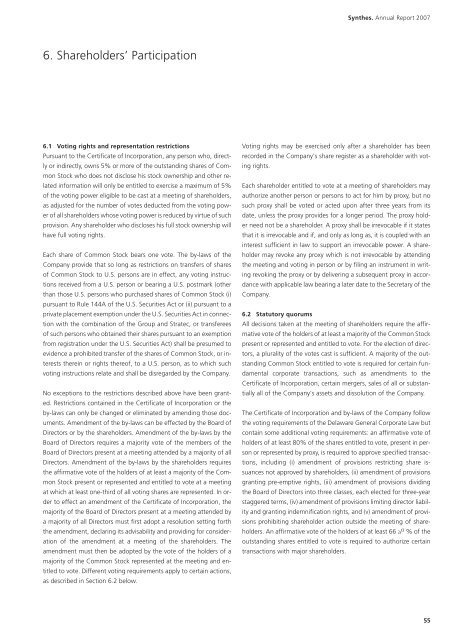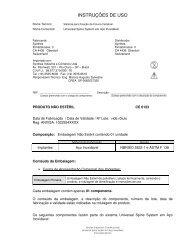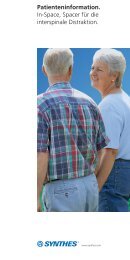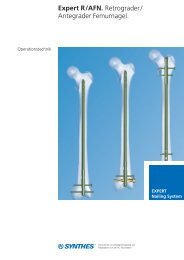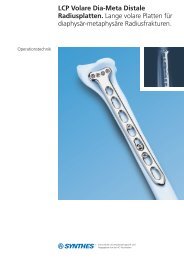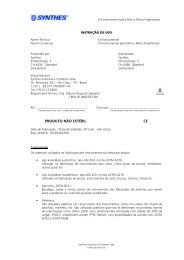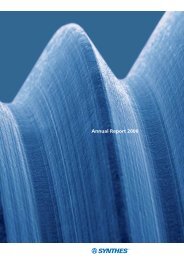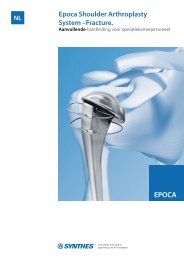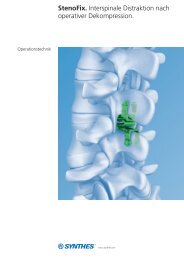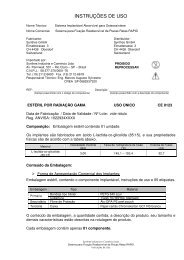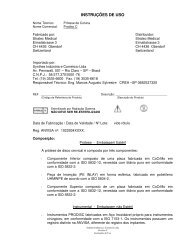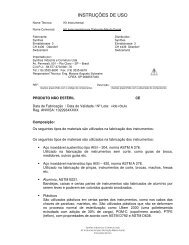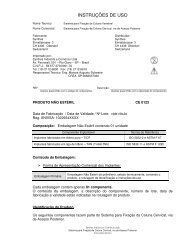Corporate Governance 2007 - Synthes
Corporate Governance 2007 - Synthes
Corporate Governance 2007 - Synthes
Create successful ePaper yourself
Turn your PDF publications into a flip-book with our unique Google optimized e-Paper software.
<strong>Synthes</strong>. Annual Report <strong>2007</strong><br />
6. Shareholders’ Participation<br />
6.1 Voting rights and representation restrictions<br />
Pursuant to the Certificate of Incorporation, any person who, directly<br />
or indirectly, owns 5% or more of the outstanding shares of Common<br />
Stock who does not disclose his stock ownership and other related<br />
information will only be entitled to exercise a maximum of 5%<br />
of the voting power eligible to be cast at a meeting of shareholders,<br />
as adjusted for the number of votes deducted from the voting power<br />
of all shareholders whose voting power is reduced by virtue of such<br />
provision. Any shareholder who discloses his full stock ownership will<br />
have full voting rights.<br />
Each share of Common Stock bears one vote. The by-laws of the<br />
Company provide that so long as restrictions on transfers of shares<br />
of Common Stock to U.S. persons are in effect, any voting instructions<br />
received from a U.S. person or bearing a U.S. postmark (other<br />
than those U.S. persons who purchased shares of Common Stock (i)<br />
pursuant to Rule 144A of the U.S. Securities Act or (ii) pursuant to a<br />
private placement exemption under the U.S. Securities Act in connection<br />
with the combination of the Group and Stratec, or transferees<br />
of such persons who obtained their shares pursuant to an exemption<br />
from registration under the U.S. Securities Act) shall be presumed to<br />
evidence a prohibited transfer of the shares of Common Stock, or interests<br />
therein or rights thereof, to a U.S. person, as to which such<br />
voting instructions relate and shall be disregarded by the Company.<br />
No exceptions to the restrictions described above have been granted.<br />
Restrictions contained in the Certificate of Incorporation or the<br />
by-laws can only be changed or eliminated by amending those documents.<br />
Amendment of the by-laws can be effected by the Board of<br />
Directors or by the shareholders. Amendment of the by-laws by the<br />
Board of Directors requires a majority vote of the members of the<br />
Board of Directors present at a meeting attended by a majority of all<br />
Directors. Amendment of the by-laws by the shareholders requires<br />
the affirmative vote of the holders of at least a majority of the Common<br />
Stock present or represented and entitled to vote at a meeting<br />
at which at least one-third of all voting shares are represented. In order<br />
to effect an amendment of the Certificate of Incorporation, the<br />
majority of the Board of Directors present at a meeting attended by<br />
a majority of all Directors must first adopt a resolution setting forth<br />
the amendment, declaring its advisability and providing for consideration<br />
of the amendment at a meeting of the shareholders. The<br />
amendment must then be adopted by the vote of the holders of a<br />
majority of the Common Stock represented at the meeting and entitled<br />
to vote. Different voting requirements apply to certain actions,<br />
as described in Section 6.2 below.<br />
Voting rights may be exercised only after a shareholder has been<br />
recorded in the Company's share register as a shareholder with voting<br />
rights.<br />
Each shareholder entitled to vote at a meeting of shareholders may<br />
authorize another person or persons to act for him by proxy, but no<br />
such proxy shall be voted or acted upon after three years from its<br />
date, unless the proxy provides for a longer period. The proxy holder<br />
need not be a shareholder. A proxy shall be irrevocable if it states<br />
that it is irrevocable and if, and only as long as, it is coupled with an<br />
interest sufficient in law to support an irrevocable power. A shareholder<br />
may revoke any proxy which is not irrevocable by attending<br />
the meeting and voting in person or by filing an instrument in writing<br />
revoking the proxy or by delivering a subsequent proxy in accordance<br />
with applicable law bearing a later date to the Secretary of the<br />
Company.<br />
6.2 Statutory quorums<br />
All decisions taken at the meeting of shareholders require the affirmative<br />
vote of the holders of at least a majority of the Common Stock<br />
present or represented and entitled to vote. For the election of directors,<br />
a plurality of the votes cast is sufficient. A majority of the outstanding<br />
Common Stock entitled to vote is required for certain fundamental<br />
corporate transactions, such as amendments to the<br />
Certificate of Incorporation, certain mergers, sales of all or substantially<br />
all of the Company's assets and dissolution of the Company.<br />
The Certificate of Incorporation and by-laws of the Company follow<br />
the voting requirements of the Delaware General <strong>Corporate</strong> Law but<br />
contain some additional voting requirements: an affirmative vote of<br />
holders of at least 80% of the shares entitled to vote, present in person<br />
or represented by proxy, is required to approve specified transactions,<br />
including (i) amendment of provisions restricting share issuances<br />
not approved by shareholders, (ii) amendment of provisions<br />
granting pre-emptive rights, (iii) amendment of provisions dividing<br />
the Board of Directors into three classes, each elected for three-year<br />
staggered terms, (iv) amendment of provisions limiting director liability<br />
and granting indemnification rights, and (v) amendment of provisions<br />
prohibiting shareholder action outside the meeting of shareholders.<br />
An affirmative vote of the holders of at least 66 2/ 3 % of the<br />
outstanding shares entitled to vote is required to authorize certain<br />
transactions with major shareholders.<br />
55


